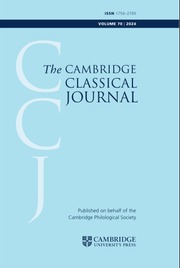Article contents
THE ROLE OF LYSIAS’ SPEECH IN PLATO'S PHAEDRUS
Published online by Cambridge University Press: 16 February 2021
Abstract
This article argues that the attribution to Lysias of the erōtikos (230e6–234c5) in Plato's Phaedrus is more significant than has generally been acknowledged. The erōtikos is attributed to Lysias because he is a logographer, whose success is dependent on writing speeches for other people. A careful consideration of both the context and the content of the speech encourage us to consider its relevance to Socrates. By attributing an (underwhelming) attempt at Socratic rhetoric to Lysias, the Phaedrus frames his speech as an example of the potential pitfalls of putting words into Socrates’ mouth. As such, the speech has broader significance for our understanding of what it means to write Socratic logoi.
- Type
- Research Article
- Information
- Copyright
- Copyright © The Author(s), 2021. Published by Cambridge University Press on behalf of The Cambridge Philological Society
Footnotes
I am grateful for the constructive comments, patience and guidance of Andrew Morrison, Elizabeth Pender, Kelli Rudolph, Frisbee Sheffield, Stephen Todd and James Warren.
References
Works cited
- 2
- Cited by


